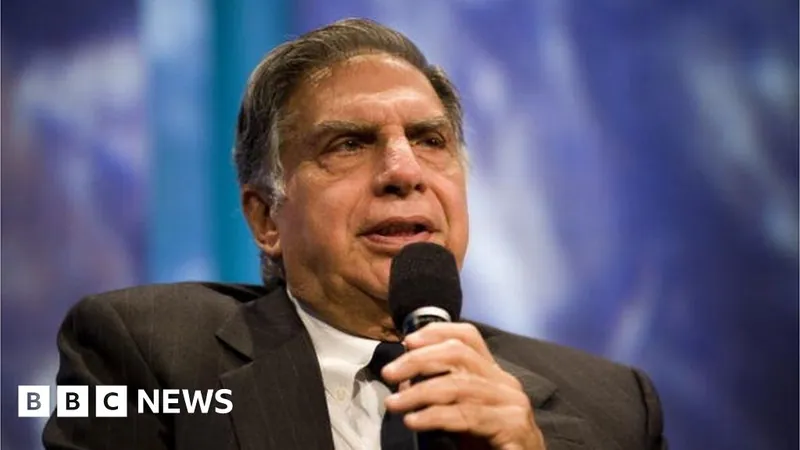
Ratan Tata: The Remarkable Legacy of India's Modest Tycoon Who Passed Away at 86
2024-10-10
Author: Wai
Ratan Tata, the esteemed Indian industrialist, has died at the age of 86, leaving a legacy that will reverberate across industries and generations. Known widely as a "modest" leader, Tata presided over the Tata Group—a colossal conglomerate with over 100 companies and a workforce of around 660,000 employees—spanning sectors from automotive to steel while generating annual revenues exceeding $100 billion.
Founded by Jamsetji Tata in 1868, the Tata Group is one of the oldest and most respected enterprises in India. The company's commitment to intertwining business with philanthropy is evident in its operations. As Peter Casey, the author of *The Story of Tata*, notes, the ethos behind the group is to enhance lives while generating profit—a dual purpose rarely seen in modern business.
Born into a Parsi family in Mumbai in 1937, Tata faced challenges early in life, including his parents' separation. He pursued higher education in the United States, earning a degree in architecture from Cornell University, where he also learned to fly. His adventurous spirit was tested during his time in college when he experienced multiple harrowing incidents while piloting his own aircraft.
Returning to India in 1962 to assist his ailing grandmother, Tata was encouraged by family mentor JRD Tata to join the family business. His early career began on the factory floor in Jamshedpur, where he honed his understanding of the automotive industry. Over the years, he became known for his remarkable turnaround strategies, especially during the 1970s when he revived struggling companies within the conglomerate.
Ratan Tata's leadership journey took a significant leap in 1991 when JRD Tata appointed him as the successor amid fierce competition. Facing skepticism from the media, Tata proved his critics wrong by transforming the Tata Group into a global brand, with a focus on consumer goods.
Under his guidance, the group made bold acquisitions that positioned it firmly on the world stage, such as the landmark purchase of British luxury car brands Jaguar and Land Rover, along with the Anglo-Dutch steelmaker Corus. However, Tata faced hurdles too, including a high-profile failure in the telecom sector.
One of the company's most notable triumphs occurred in 2000 when Tata acquired Tetley, making it the world's second-largest tea producer. This acquisition showcased Tata's strategic foresight and willingness to put Indian companies in the global spotlight.
Tata's vision extended into automotive innovation with the launch of the Tata Nano in 2009—the world’s cheapest car aimed at making automobile ownership accessible. Regrettably, despite initial success, the Nano struggled due to production and marketing challenges. Tata later confessed that marketing the vehicle as "the world's cheapest car" proved to be a misstep, as consumers preferred not to associate with that label.
Tragedy struck in November 2008 when the Mumbai terror attacks targeted the iconic Taj Mahal Palace hotel owned by Tata. With 33 people killed, including hotel staff members, Tata’s response was emblematic of his character as he committed to financially supporting the victims' families and investing over $1 billion for the hotel’s swift restoration.
Towards his career's end, Tata became embroiled in controversies surrounding Tata Sons after returning as interim chairman in a turbulent leadership battle that eventually saw Natarajan Chandrasekaran taking the reins. Critics noted the high-stakes corporate maneuvering was a stark contrast to Tata's otherwise unassuming persona.
Described by Casey as a “modest, reserved, and even shy man,” Tata's disciplined routine included daily handwritten to-do lists. His commitment to integrity and social responsibility was highlighted in his reflective commentary regarding labor relations during a factory strike in 1989, indicating a deep sense of accountability to his workforce.
In public talks, Tata often expressed his aspirations for India, envisioning a nation where every citizen could achieve success based on merit. He emphasized the importance of humility and leading by example in a society that frequently values wealth and status.
Ratan Tata’s passing marks not just the end of an era but also the continuing influence of his principles on the next generation of leaders. His life serves as a powerful reminder of the value of modesty, resilience, and integrity in the world of business.


 Brasil (PT)
Brasil (PT)
 Canada (EN)
Canada (EN)
 Chile (ES)
Chile (ES)
 España (ES)
España (ES)
 France (FR)
France (FR)
 Hong Kong (EN)
Hong Kong (EN)
 Italia (IT)
Italia (IT)
 日本 (JA)
日本 (JA)
 Magyarország (HU)
Magyarország (HU)
 Norge (NO)
Norge (NO)
 Polska (PL)
Polska (PL)
 Schweiz (DE)
Schweiz (DE)
 Singapore (EN)
Singapore (EN)
 Sverige (SV)
Sverige (SV)
 Suomi (FI)
Suomi (FI)
 Türkiye (TR)
Türkiye (TR)